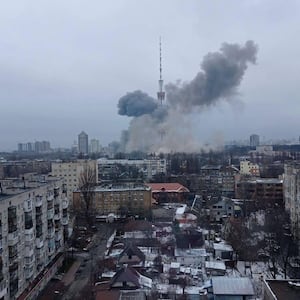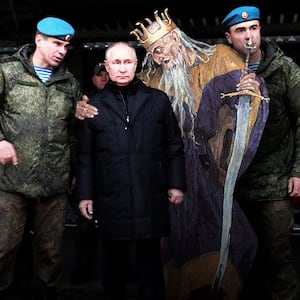Vladimir Putin may not be able to count on a victory in Ukraine, but if nothing else after 12 months of war Russia can at least take the honors for the most deranged propaganda.
From murderous war pigeons and mutant Ukrainian soldiers to satanist cults and organ trafficking, the Kremlin’s propaganda machine has descended into some of its most desperate babble yet to try and keep Putin’s war afloat over the past year.
And when that didn’t work, the Russian leader’s loudest mouthpieces did the next best thing—and primed the public for death.
The Daily Beast breaks down some of the Kremlin’s most epically batshit claims—and their maniacally grim downward spiral.
Murder pigeons and organ snatchers
The Kremlin’s most brazen propaganda has often first come from the lips of Putin himself.
And so it was that on the eve of his full-scale invasion last Feb. 24, the Russian leader lobbed an allegation of “genocide” at Kyiv just before his troops began indiscriminately killing the same Russian speakers he claimed were under threat by “Nazis” in power.

General view of the site of a bombing at a shopping center as Russia's invasion of Ukraine continues, in Kyiv, Ukraine March 21, 2022.
Marko Djurica/ReutersDespite that claim being repeatedly debunked during the first eight years Moscow waged war against Ukraine, Russian state TV got in step and doused viewers with a frenzied firehose of “Ukrainian neo-Nazis” and “de-Nazification” claims.
That narrative had long been so provably false it was almost laughable, so Putin’s army of media lackeys tried to up the ante with “proof”: a photo of Ukraine’s Azov fighters holding up a swastika flag that turned out to be photoshopped; menacing, top secret battle plans by Azov and the Ukrainian Defense Ministry featuring a bizarre blend of Russian and Ukrainian; Ukraine’s commander-in-chief wearing a “swastika bracelet” that didn’t exist; “foreign journalists” bemoaning the horrors of the Kyiv “regime” who were actually Russian bloggers.
Despite all the propagandists tying themselves into knots to sell the Nazi narrative, the Kremlin soon figured out it just wasn’t working. As Proekt reported last May, secret telephone surveys conducted on the orders of the Kremlin revealed that most Russians didn’t understand the meaning of the word “de-Nazification.”
“After that, it was a mess—every week we looked for new words, but we couldn’t find anything favorable,” one source close to the Kremlin said.
(It certainly didn’t help that Russian troops themselves began publicly calling BS on the Kremlin’s claims, with one soldier sent to Ukraine admitting in an interview with iStories that he and a colleague had a shocking revelation upon arrival: “I told him, ‘Do you even realize that we’re the fascists?’”)
It was around that time that the Kremlin pulled out the big guns: birds loaded up with “bio weapons” that somehow “selectively target” only certain ethnic groups (Russians).
“At least two species of migratory birds were identified, the routes of which pass mainly through the territory of Russia,” Igor Kirillov, head of radiation, chemical, and biological defense of the Russian Armed Forces, told Russian media.
The avian terror was discussed on all the country’s big channels, including the notorious trash peddler Channel One. Soon enough, it became clear that the latest tall tale was not so much helping the war effort as it was sparking a wave of outrage at local pigeons.
“Attention! In Ukraine, 36 U.S. laboratories have been infecting birds and rodents with diseases (plague, cholera, etc.) intended for us … for 20 years. Please! Do not attract pigeons with bread! Protect your families (and mine) from infection,” read one panicked flier taped at the entrance to a Russian apartment building in Belgorod.
Bird discrimination aside, it was obviously clear from the get-go to the Kremlin’s spin doctors that fearmongering was a crucial weapon to be used—against the country’s own citizens.
The “Ukrainian neo-Nazis” narrative soon branched out into other popular bogeymen: Ukrainian satanists enlisting the help of “otherworldly forces” by writing “evil” symbols in blood, for instance.
RIA Novosti, one of the country’s most “authoritative” state-run news organizations, was among the first to start pushing the Satan worship narrative, claiming as early as March 2022 that signs of “black magic” had been found in Ukrainian headquarters. Warmonger and Chechen leader Ramzan Kadyrov soon began referring to Ukrainians as “satanists,” while state media continued to routinely quote “cult experts” to endorse the claim and “de-Satanization” soon became the new mission of Russia’s war. Lawmakers and the Russian Foreign Ministry soon jumped on the “Ukraine is run by satanists” bandwagon as well.
(Never mind that all the while, the Kremlin’s most “holy” authority, Patriarch Kirill, was unabashedly cheering on the murder of Ukrainian civilians, which he framed as a mission from God to save the world.)
Of course, what good is a satanist cult without blood and gore? Ukrainian authorities are not only summoning dark spirits, but also harvesting the organs of perfectly healthy soldiers, according to RIA Novosti just this month.
Good vs. Evil
The “firehose of falsehood” model was forced to undergo adjustments, of course, after it became clear to the Kremlin that conquering Ukraine was to be no easy fight. Certainly not the days-long affair that Kremlin war planners had envisioned.
That’s why they have propaganda.
While Moscow initially went out of its way to frame the war as something happening far away from ordinary Russians, “a special military operation” limited to Ukrainian soil, that began to change as the Russian military suffered more and more humiliating setbacks on the battlefield and Putin resorted to a military call-up last September.
From that point on, the Kremlin’s mouthpieces seemed more intent on selling the specter of Ukrainian troops—led by Western forces—marching deep into Russian territory.

Ukrainian servicemen of the 80th Air Assault Brigade sit inside a Bushmaster Protected Mobility Vehicle, amid Russia's attack on Ukraine, near Bahmut, Donetsk region, Ukraine, February 16, 2023.
Marko Djurica/ReutersKadyrov joined a slew of pro-Kremlin military bloggers in amplifying the claim that all Russians would suffer a grim fate at the hands of Ukrainian troops if Putin’s war fails, bellowing that they would “come to every home” in Russia.
Authorities routinely claimed to have thwarted terrorist attacks plotted by Ukrainians on Russian soil, incidents feverishly covered in state media, and the Kremlin’s decision to demonstratively install air defense systems on Moscow’s rooftops last month was also widely seen by experts as a bid to further stoke fears of a Ukrainian attack on the capital.
Such messages have apparently not gone unnoticed by ordinary Russians.
“Attention! Warn your loved ones, relatives, and neighbors!… Saboteurs are planting telephones, tables, wallets, notebooks and other objects that attract attention on roads, at street-stands and in shrubs. All of these things are mined… Yesterday a passerby in Voronezh picked up a passport and it tore his hand off!” a flier circulating among Moscow residents read this month, according to Sota.
In tandem with that, of course, is the drive to sell Russians, especially young men, on the notion that fighting in Ukraine will eternalize them as heroes on par with those who defeated Nazi Germany.
Or at least pay off their debts.
A series of cringeworthy advertisements circulated on pro-Russian social media channels have seen actors in poorly scripted scenes extolling the virtues of joining the war effort: a man being threatened by loan sharks is rescued by signing a contract with the Russian military; a down-on-his-luck middle-aged father is able to win back the admiration of his disgruntled daughter by going off to serve and buying her things with his pay.
“I saw on TV how our peers are saving civilians in the Donbass. And we’re sitting here getting drunk,” one young man tells friends in such a video, concluding that it’s time to “make himself useful.”
The pro-Kremlin outlet Readovka released an article claiming Muscovites were eagerly volunteering themselves for Putin’s war effort shortly after he announced the mobilization. To prove their point they interviewed an “ordinary Muscovite” who said he’d volunteered because otherwise he “would never forgive himself”—but he turned out to be an RT staffer.
Russian state-controlled media has also regularly churned out glowing testimonials about the “heroism” displayed by prison inmates who join the notorious Wagner Group to fight.
“We want to return to finish what we started and continue to protect the motherland. To beat the Nazis like our grandfathers did,” one convict told RIA Novosti last month.
Russian officials, meanwhile, have gone out of their way to downplay the staggering death toll, and censors have worked in overdrive to keep reports of disobedient troops being executed or tossed in basements limited to independent media outlets deemed “foreign agents.”
‘Death awaits us all’
Nonetheless, the Kremlin’s propaganda machine eventually caught up to the new reality and the overall message took a tragicomic shift: if pro-Kremlin pundits were previously predicting a resounding victory, now they were encouraging the public to embrace death.
If your son dies in the war you can get a new Lada, one now-famous segment on Russian state TV proclaimed.
The Kremlin’s loudest mouthpieces got on board.
“Life is highly overrated,” Vladimir Solovyov told his viewers last month. “Why be afraid of what is inevitable? Moreover, we’ll go to heaven. Death is the end of one earthly path and the beginning of another.”
“It’s only worth living for something you can die for, that’s the way it should be,” he said.
“Death is inevitable, death awaits us all. It’s not a fact that it is better to die a weak person from some long and terrible illness than like this and for some proper and important deed,” RT editor-in-chief Margarita Simonyan told those watching a talk show on state-run TV earlier this month.
Soon, the only decipherable goal in Putin’s so-called “special military operation” appeared to be death.
The president’s top cheerleaders reassured TV viewers they’d “go to heaven,” and then admitted even they had no idea what the hell the point of the war is—even though they still wholeheartedly support it.
“Those who complain that the objectives aren’t clear and ask, ‘What does it mean?’ … We don’t need to be specific. The objectives change depending on possibility,” Simonyan said in a bizarre video last week.
“You don’t need to demand that our commander-in-chief, that our government, specify the goals in cases where they may change,” she said.
One might ask if the propaganda machine’s obvious desperation signals it is finally in its death throes. No such luck.
Its tentacles have multiplied since the start of the full-scale invasion thanks to a sort of “‘decentralization” of the whole apparatus. Now, Russia’s pro-war narratives are spread not only on state television, but by hundreds of “patriotic” military bloggers using “alternative” platforms like Telegram.
“The Russian blogosphere is actively involved in the information war,” a recent investigation by the analytics firm IDS Partners found.
While these bloggers are technically “unofficial” propagandists, there are signs they get their orders straight from the top. The investigative outlet The Bell reported last November that one of the most popular pro-war Telegram channels, Rybar, was linked to Wagner Group founder Yevgeny Prigozhin.
IDS Partners warns that at least 23 bogus news sites have been amplifying claims made by these nationalist military bloggers to “positively portray the Russian invasion.” They then get laundered to foreign audiences.
Among the latest horror stories fired off into the propaganda ecosystem from this network of bloggers is a familiar tale: “At the positions of the Armed Forces of Ukraine, along with abandoned weapons, they are finding containers for transporting organs. The work of organ harvesters is going marvelously.”








